By Uran Kalakulla
Part Five
Nazism and communism
Memorie.al / Nazism lasted 12 years, while Stalinism lasted 2 times longer. In addition to many common characteristics, there are many differences between them. The hypocrisy and demagogy of Stalinism was of a more subtle nature, which was not based on a program that was openly barbaric, like Hitler’s, but on a socialist, progressive, scientific and popular ideology, in the eyes of the workers; an ideology that was like a convenient and comfortable curtain to lie to the working class, to lull the sharpness of intellectuals and rivals in the struggle for power.
One of the consequences of this peculiarity of Stalinism is that the entire Soviet people, its best, most capable, hardworking and honest representatives, suffered the most terrible blow. At least 10-15 million Soviets lost their lives in the torture chambers of the KGB, martyred or executed, as well as in the camps of the Gulag and others like them, camps where it was forbidden to correspond (in fact they were prototypes of the Nazi death camps); in the mines in the ice of Norilsk and Vorkuta, where people died from cold, from hunger, from crushing work in countless construction sites, in the exploitation of forests, in the opening of canals and during transportation in lead-lined wagons, or in the flooded barns of the death ships.
Continued from the previous issue
So, it happened to me and Tanushi exactly as the popular proverb says: “If you don’t catch a mouse, it will also look for a pumpkin after it”. We were still discussing Pjetri’s work, when we also found out about his tail! This, in a somewhat more humane way, I told Pjetri, or Pjerini, as Tanushi called him, since the time we met in Shkodra. And then Pjetri introduced us, with the above information. He even added that Zeqiri knew Russian well and that he had submitted a book (translated by him) by Kuprin for publication.
At first glance, Pjetri seemed to me to be a young man who had just started to go bald, with a charming face and intelligent eyes. While Zeqiri, a more mature man, with thick hair that had just started to turn gray, with a thick mustache, like Stalin’s. I don’t know for sure what Tanushi had discussed with Pjetri beforehand, that is, if he had kept the order, to only conduct surveys with him and not to reveal anything at all, not the existence of the Tirana group, but anything else of importance.
I say this today, because since then I noticed that Pjetri seemed to rush to quickly get into the topic, after some kind of more cheerful “warm-ups” somewhat with a political slant, to which I generally maintained a measured stance. But in any case, some political retort was inevitable, without being pushed too hard. Whereas Pjetri seemed to rush to empty his entire arsenal, without the slightest reserve.
Thus, I am convinced even today, as I was then, that Pjetri thought that the four of us should be the initiators of a political group, without knowing at all that we had already had such a group for a year and that that meeting for us in Tirana was nothing more than a survey, nothing more. Very much so, for us, the recognition and acceptance of these two new elements would remain, even in other possible meetings, only in the rank of debatable candidates for acceptance or not into the group and, always on its periphery, at least until we were completely convinced and created the necessary trust. And this was more than natural.
Peter or Peter, as Tanushi, who had been a friend since he was seven years old, had a strong attraction for me since the first time we met, even more so than Tanushi, who had been an old friend. Why? Was it because I was older than him, about six years, or because he saw how Tanushi respected me and this made him understand that I must have some special weight? Yes, with this hunch of mine, I was not wrong at all, because further experience in prison life completely confirmed my assumption. In fact, one of his psychological traits was to attract people who seemed to him to have “value” and could help him get a hold of something that he was very interested in.
The surname Arbnori did not seem natural to me and when I asked him about it he told me that it was exactly his surname, which came from his family’s village of origin, that there was a village across the border, in the Krajë area, called Arbnor. At that time I did not know much about geography and especially about the toponymy of the Shkodra district, but when I got out of prison and had to acclimatize myself with Shkodra, I asked and no Shkodra resident, not even a Sirok resident like Pjetri, told me that there really was such a village, with the surname Arbnori. Thus my suspicion at that time was confirmed, that that surname was completely made up, with an obvious aim of ambition, glory, sounding…?!
At the second meeting in Tirana, this time with only Pjetr, where Tanushi was also present, the Durrsak told me that he had drafted a draft program, which he very much wanted us to see. I told Pjetr that there was no need for such work, of course without giving him any hint, that we already had our program, and why not written down, as he wanted to keep it. But since he insisted a lot, we told him to come to Tirana on May 27 with all of Zeqir, to my house, where Tanushi would also be and there they would leisurely see what he had written. The meeting was at two o’clock. No delay or absence was allowed. Absence meant either the death of one of the two, or arrest. And that is what really happened. We would refer to the other friends of our Tirana group about the outcome of the meeting.
On the appointed day and time, they did not come. As we later learned, at 09:00 that day, the Sigurimi went and arrested Zeqiri in his office, while he was printing the second part of Pjetri’s program. He arrested him as he was passing by the Branch, at 12:00 noon. Tanushi and I were arrested at around 07:30 that evening, while we were walking on the boulevard of Tirana, as we will see later.
After a long investigation of over a year, finally, on August 8, 1962, they brought us to trial together, the “Tirana group” and its two potential candidates from Durrës. The trial lasted four days. It took place in the Tirana District Court, which was then located on “Rruga e Durrës”. It was held behind closed doors, with invitations only for party members and security personnel, and none of our family members were allowed to be present.
Our trial was conducted by a team from the Tirana District Military Court, with Colonel Llazi Polena as president, a member; Lieutenant Colonel Reshat Nepravishta (a member of the Medemek and a writer), and the first captain, a certain Mexhiti. The prosecutor was Major Sami Kapllani, who, after some time from our trial, I learned that he himself had been imprisoned, as an ordinary, I think for theft. On the fourth day of the trial, the verdict was given: me and Pjetri to death (by shooting), Zeqir Koçi to 20 years in prison, Riza Kuçi to 15, Agim Musta and Tanush Kaso, to 13 each, and, finally, Kahreman Paftali, to 10 years.
Discovery and arrest
The discovery of our group, which inevitably led to its arrest and liquidation, remains to this day for me an equation with many unknowns. I have only two pieces of information, but I still do not know the full truth. It may still be hidden in the conscience of some participant in the group, or those who would possibly join it later. I say this because I have incomplete and inaccurate information, that one of the members of the group, apparently frightened by participation in it, went and denounced its existence and the names of the participants, certainly to the Internal Affairs Branch, long before we were arrested.
The second version, and the most credible for me, is that we were denounced shortly after we met, met and started talking to Pjetër Filip (Toma or Arbnori) and his close friend, Zeqir Koçi, originally from Golloborda, both of whom were then residents of Durrës. During the trial, I found the opportunity to ask Pjetër about this matter. And he told me that he had instructed his friend, Zeqir, that, about the conversations they had had among themselves and then with me and my friend from the group, Tanush, he could talk if he wanted to with the whole of Durrës, but not with his cousin, Zenun Balla, because he was an agent of the Branch. But Zeqir had done the opposite and as we will see further, when talking about my first investigation in the Tirana Branch, after the arrest, this thesis of Pjetër, seemed to be confirmed to me.
As for the second variant, I still don’t have any direct or indirect confirmation. Are there other variants in this middle? It’s possible! But I don’t have facts and I’m not in the habit of dealing with guesses. This work of our intelligence, the most accurate variant, must be in the Sigurimi operational files. But where can I find that file, where can I look for it, who can give it to me, today? It was Saturday, May 27, 1961. When I returned from the village school where I taught, mainly Albanian language and elements of literature, I had lunch and waited for Tanushi to come first.
My mother, the deserted one, took care to honor my friend, since my wife was not at home, who, together with her son, had been in Shkodra, with her mother, for two weeks. And we waited for the two Durrsaks to arrive. I had told them that they not only had to come, but that they had to be punctual, dead or alive. Failure to come would mean arrest or some greater misfortune. Two o’clock passed and I began to get nervous. If they came late, I would wait for them with my feet first, as an Albanian expression says. But they continued not to come.
Tanushi felt or seemed calmer. But I began to get seriously worried. Not because their “Durrask masters” were no longer giving us orders, but because I began to sense danger. While Tanushi continued his naive and comforting guesses, like a kind of Voltaire’s Candide, with his well-known motto: “Everything is for the best in this world.” We had agreed that, after the meeting, those from Durrës would return to their city, while Tanush and I would meet our friends in one of the cafes on the boulevard to explain the results achieved.
Around six o’clock, I put on the new suit I had, the only one, and together with my friend, we went out to the boulevard. But as we started to leave my apartment, I noticed that I had forgotten my watch. And I went back home to get it. When I came out again, I noticed that in the corner of the building where I lived at the time, by Lana, there was a man with a cap on his head, who was following me with his eyes. My mind immediately went that he must be from Dega, and I told Tanush this too. But he, as always, laughed and was surprised by my nature, both suspicious and prone to bad events.
On the boulevard we met only Agim, with a friend of his, whom I also knew, but who had nothing to do with our business. Riza Kuçi, had not come out at all, I don’t know why. And we continued our walk, as was usual in those years. And the boulevard had begun to fill up with walkers like our business, men, women, young men, and young women. But as we walked, I noticed that behind us, at a certain distance, were Major Besim Selita, accompanied by some civilians and soldiers. I knew who he was. He was the head of the Internal Branch of the Tirana District (not the city), and at the same time a member of the District Party Bureau.
Moreover, I knew him, because I had seen him come to the District Executive Committee from time to time and that he had married a girl from Petrela, whom I had had, years ago, as a student in the seventh grade of Mulleti. At that time, she worked as a clerk in the Committee’s apparatus. And I already expressed my doubts to both Tanush and Agim, but they laughed at these doubts. Of course, I told them in a way that Agim’s friend, a young engineer, named, if I’m not mistaken, Muharrem Seseri, a tyrant, wouldn’t find out.
That day, the trial of Teme Sejko and his friends had ended, and the verdict had been death, by shooting, for four or five members of that group. The trial had taken place in the “Brigada” cinema, a huge barracks in the square behind the ministries, built during the Italian era. And as we walked with Tanush to get out onto the boulevard, we passed through that square, stepping right on the tracks of the wheels of the car that had taken the newly convicted people of that trial with it, to take them to the firing squad. And I had expressed this thought to Tanush. But he laughed again, with that characteristic laugh, and told me, as if with a kind of reproach, that I was becoming a thorn in Brahim! But I replied:
– That’s what you say, Brahim-Brahim, but if we escape tonight without being arrested, then we will escape at all!
And unfortunately, my word came out and not his. Where “Rruga e Dibra” ends at the boulevard, I met a friend of mine, who did not know the others. He was on a bicycle. And he asked me for about 2,000 lek (old), a loan for a few days, because he had run out of money for food, for himself and his family. I, of course, gave it to him, although I had little for myself and my family. Just at that moment, the urban bus of that street arrived and stopped for a moment, just to take the turn of the boulevard. At that moment, I had the idea of taking my friend’s bike and riding through the streets of that area, which I knew well, because I was born and raised in Tirana. But thought, which is always faster than action, prevented me.
First, I would never be able to return home. Who could shelter me in forced illegality? Second, the only way out for me would be to escape across the border. But I knew neither the roads nor the areas and I had no one to help me. Third, illegal or fugitive, my family would suffer my old mother, my young sister, my brother, and especially my wife, still a young bride and a broken heart.
Fourth, wouldn’t it be considered a betrayal for my bandmates, leaving all the responsibility to them? No, I told myself, surrender and pay for your work yourself. So I let my friend ride off on his bike and joined my former hiking companions, without saying a word to them about what I had previously thought. The reader of these lines, today, has the right to judge, for the choice of my alternatives at that time: was the attempt to escape, a possible party, logical and fair? Or was my surrender fair? Were the reasons for this surrender convincing, or was it a horned stupidity?
When I stopped with my bike buddy and the city bus came between me and our pursuers, I noticed that our pursuers became worried and talked to each other. So it became very clear to me now that they had me in their pursuit. And I noticed that they came even closer to us and talked to each other. So the moment of their action was approaching. And I was completely convinced of this. But still, an illusion that is not shared by man, like hope in the face of danger, seemed to lie to me, telling me that all my observation and thought about the expected danger was nothing more than a guess and that the presence of insurance was nothing more than a coincidence. And this illusion closely resembled that of the donkey in the fable, who thought, having the wolf on his back, that it was just a dream and nothing more.
Our last walk, in fact, did not last long, because as soon as we arrived in front of the Clock Mosque, the security guards narrowed the circle, put us in the middle, and pushed us towards the sidewalk of the shrine. The first of them, Major Besim Selita, spoke first:
– Do not do anything that would cause a scandal! – And after a while he added:
– Take out your documents!
I was almost sure that he knew me, based on the wife who had been my teacher, as I told you before. But he insisted on his and I took out my ID. When he was sure who we were, the major spoke again:
– Walk among us, without saying a word!
They grabbed us by the shoulders and we set off towards the narrow road behind the current City Hall, a road that leads towards the then and current Ministry of the Interior. I did not notice if our arrest in the middle of the square caught the eyes of passersby. I am convinced that they did, because they were walking a few meters away from us. And we were not completely unknown people in Tirana, as old citizens of it. The fact is that, as I found out years and years later, when I was already released from prison, the news of our arrest quickly spread and, that very night in Tirana, all our acquaintances and friends trembled.
I noticed that my three friends had turned white in the face. And the one among us, the engineer, who was not a member of the group at all, seemed to be shaking like a perch. But the biggest surprise was that it seemed to me that our arresters were also shaking. Did they think that we had weapons and were trained terrorists, that we would resist them and take their lives on the spot, only to be caught off guard later! Could our security have been that brave? I did notice my friends and the security forces themselves, but I don’t know how I looked at my face. I only felt that my body had turned to stone and I would say that I would be very gloomy on my face.
It was as if in those moments a physical pressure had gripped my body, and in my soul, I felt an internal revolt that was growing from moment to moment. But for me, the greatest lesson of those difficult moments, among others, was that the security forces were not those brave captains who boasted on the boulevards when they encountered the real enemy, even though they were unarmed, nor those brave “silent heroes” with papers, about whom the regime’s penmen so clearly sang, or the filmmakers of that time made commissioned films.
At the turn of the alley, Tanush and I were put into a kind of pickup truck, with our backs to the driver. On both sides, we were held tightly by Major Besimi, on my side, and another horseman, on Tanush’s side. I noticed that they were also shaken, and I could even feel the major’s trembling in my arm. What was this trembling of his, nervous tension or fear? Or a feeling of “great responsibility”, that they had managed to catch “very fat game” and wanted to take it “fresh” to the kitchen of the red sultan, like obedient and trained hunting dogs, to provide choice meat for their master’s table?
Tanush and I were left like that, while Agim and his friend were left under the care of the guard officer of the General Directorate of Police, the former building of the Bank of Naples, back in the time of Zog. So it was clear that Tanushi and I were the “first course”, chosen, preferred. The other two, a kind of salad…!
The road from there to the then Dega was not far, especially by car. And all Tirana residents know that that damned Dega was located in Selvia. This tall tree, almost larger than a large mosque minaret, together with the pine tree on today’s street, named “Tefta Tashko”, can be called natural cultural monuments for Tirana, but during Hoxha’s regime, the desert cypress had become a symbol of evil, fear, and horror for the capital’s residents.
It had become a symbol of the Security Branch next to it. So much so that the threatening or warning expression; “Don’t talk, or you’ll end up in Selvia”, would have meant for Tirana, the same as saying to a Russian in Moscow; “you will go to Lubyanka”! No matter what you say, the communists, or their vanguard, the Sigurimi, were very skilled at creating such symbols of terror.
The desolate cypress, this ancient ornamental tree of peace, and therefore of graves, had been reduced to a symbiosis of torture, as a warning of great torments, infernal suffering, as the gate of death with terror. Oh, who knows how many screams of pain from beatings and tortures, that ancient tree had heard; especially at night, when the neighborhood around there cowered in terror and people in their sleep would wake up terrified and trembling, and they would even cover their heads with a blanket, like those children who want to hide, out of fear, from the image of the grave.
People who happened to pass in front of the cypress tree would quicken their steps, as if the door of the nearby Branch was a kind of slaughterhouse that, if you approached it, sucked you inside, from which it was almost impossible to get out alive. That door was exactly like the entrance to the great Dante’s hell, this poetic god of the creation of the world of torment, of the afterlife.
I have been, and still am, since my earliest youth, a passionate admirer of the great Florentine, so much so that, in addition to reading and studying about him, with entire volumes, I knew by heart entire canticles of the “Divine Comedy”. That’s exactly why, when I passed those moments at the entrance to that cursed place, I swear to you on my honor, almost suddenly, on the metal arch of that door, I thought I read, written in fiery letters, the sculptural words of the entrance to Dante’s Hell: “Abandon all hope, O you who enter…”! Memorie.al





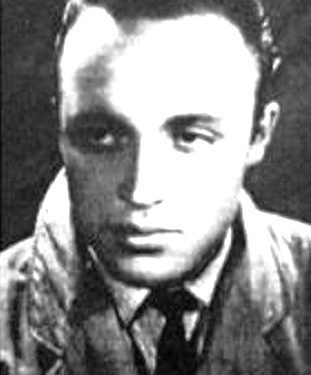
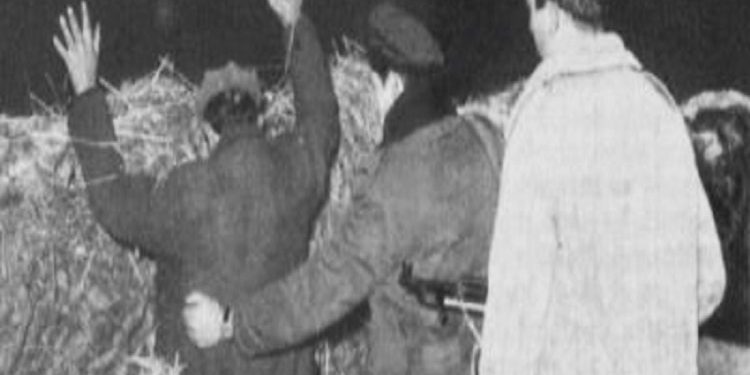
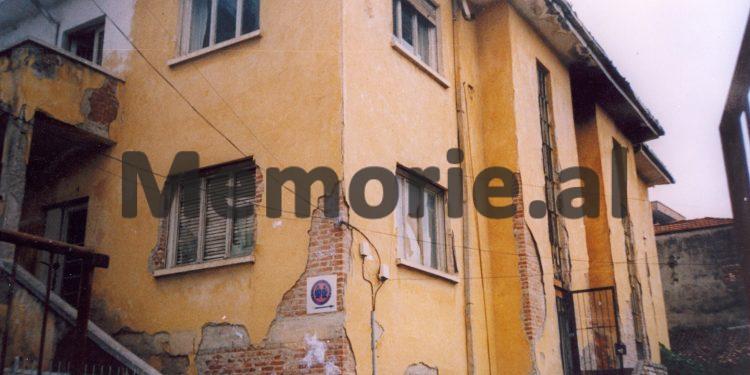
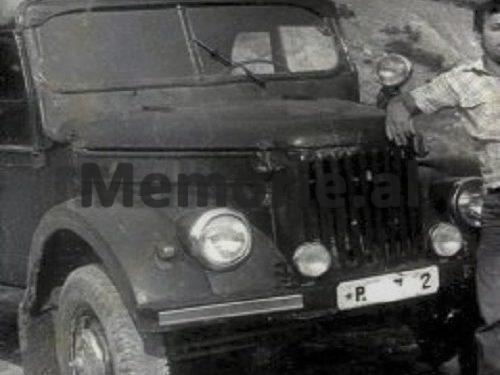
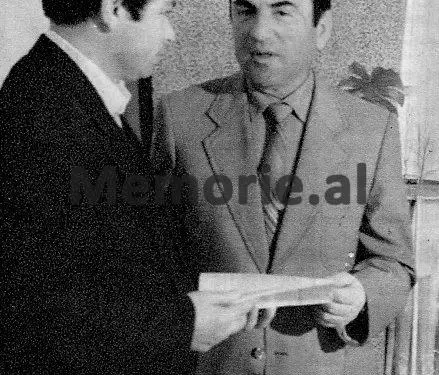


![“The ensemble, led by saxophonist M. Murthi, violinist M. Tare, [with] S. Reka on accordion and piano, [and] saxophonist S. Selmani, were…”/ The unknown history of the “Dajti” orchestra during the communist regime.](https://memorie.al/wp-content/uploads/2026/02/admin-ajax-3-350x250.jpg)
![“In an attempt to rescue one another, 10 workers were poisoned, but besides the brigadier, [another] 6 also died…”/ The secret document of June 11, 1979, is revealed, regarding the deaths of 6 employees at the Metallurgy Plant.](https://memorie.al/wp-content/uploads/2026/02/maxresdefault-350x250.jpg)


